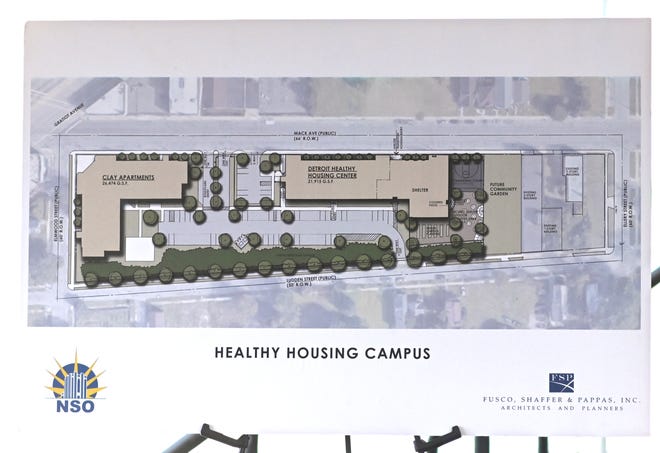|
The Neighborhood Service Organization broke ground Tuesday on the first “healthy housing center” in Detroit to serve the city’s homeless and the surrounding community. Linda Little, CEO of Neighborhood Service Organization, said construction on the Mack Avenue facility will wrap up in 18 months and the building will open soon after. In addition to 56 beds of emergency shelter, geared toward people “medically at risk,” the facility will offer 17 beds for “medical respite,” for people not ill enough to remain at a hospital, but not well enough to safely be returned to the street or a shelter, officials said. Linda Little, CEO, Neighborhood Service Organization, announces the latest phase of the nonprofit group's $22 million Detroit Healthy Housing Campus during a groundbreaking cermony in Detroit on November 30, 2021. Max Ortiz, The Detroit News The project marks the second phase of the NSO’s Detroit Healthy Housing Center. The first part of the $22 million effort is the Clay Apartments, which offer 42 units of one-bedroom housing for single adults. The apartments opened in September 2020 and are fully occupied, officials said. Little said Detroit has contributed about $5 million toward the 22,000-square-foot building. The group raised about $10 million for phase two, but about $1.3 million in "unmet development costs" remain and NSO is seeking donations to help, officials said. Detroit Mayor Mike Duggan, formerly CEO of the Detroit Medical Center, said during a groundbreaking at the site Tuesday that "the homelessness model in this country is not working." Artist rendering Max Oritz, The Detroit News "You take the vulnerable population in, you keep folks warm and then at eight o'clock in the morning, you send them back out on the street," the mayor in regard to the national model that he said has fallen short.
While there is value in offering warmth and shelter to those who need it, Duggan said, a different strategy was needed in Detroit. NSO, he said, is a "pioneer" of that model, which has been permanent supportive housing. "Instead of giving people 12 hours of shelter you actually move our citizens into permanent housing where they have support for mental health services," Duggan said. "They have support for addiction services. They have help in resume writing. And placement in jobs." Little said the vision has been 15 years in the making and was championed by her predecessor, Sheilah Clay, who retired in 2018 from the Detroit-based nonprofit. "Because access to health care is not widely available for those who are vulnerable, such as individuals who are homeless, seeking care when their conditions reach a point of urgency or emergency status is all that's left available to them," Little said. "They are five times more likely to be hospitalized. They have higher rates of (emergency room) utilization and hospital readmissions, and they're not connected to wellness and preventive care," Little added. "This healthy housing campus is one solution that we hope to scale to other parts of the community to create that access." Duggan said that while "you're seeing stories across the country, about the homeless population rising, you're not seeing those stories in Detroit. "We have a problem, but we got the problem going in the right direction," Duggan said. According to the 2020 State of Homelessness report published by the Homeless Action Network of Detroit, homelessness in Detroit fall 22% in 2020, to 7,811 people. That's down from the 10,006 tallied in 2019, before the COVID-19 pandemic. Elizabeth Hertel, director of the Michigan Department of Health and Human Services, made the trip south from Lansing for Tuesday's event. Hertel said Michigan had about 61,000 people "experience homelessness" in 2019. Roughly 52% of them are Black, despite African Americans accounting for less than 15% of Michigan's population. Detroit accounted for roughly one in six of Michigan's homeless population. "Someone's ability to access safe affordable housing can directly impact or be impacted by a person's health or their health care coverage," Hertel said. "It poses challenges for job seekers," she continued. "It poses challenges for people with substance use disorders who are trying to become clean and beat their addictions. It can act as a persistent barrier to the basic economic stability that overlaps or influences other social determinants including food security, reliable transportation, school attendance, and whether or not a person seeks health care." In addition to the emergency beds and the medical respite beds, the healthy housing center will open its health care clinic open to the wider community. The clinic will offer primary care, behavioral health, dental services, and fulfill prescriptions at its pharmacy. Resource: https://www.detroitnews.com/story/news/local/detroit-city/2021/11/30/nso-breaks-ground-second-phase-housing-campus-aid-homeless/8799005002/ Comments are closed.
|
AuthorWrite something about yourself. No need to be fancy, just an overview. Archives
November 2022
Categories
All
|


 RSS Feed
RSS Feed
